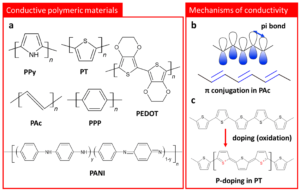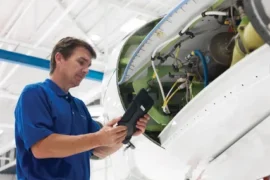Introduction
The rapid advancements in technology, particularly in the fields of Artificial Intelligence (AI) and materials science, are driving innovation across numerous industries. As AI continues to revolutionize everything from healthcare to manufacturing, there is a growing need for sustainable materials that can keep up with these advancements.
Enter biodegradable polymers—a class of materials that not only offer sustainability but also the potential to enhance AI-driven technologies.
This post explores the intersection of biodegradable polymers and Artificial Intelligence, highlighting how these two seemingly distinct fields are coming together to shape the future.

The Role of Biodegradable Polymers in Modern Technology
1. Understanding Biodegradable Polymers
Biodegradable polymers are a type of plastic that can be broken down by natural processes, such as the action of microorganisms. Unlike conventional plastics, which persist in the environment for hundreds of years, biodegradable polymers decompose relatively quickly, reducing their environmental impact.
They are made from renewable resources like corn starch, cellulose, and lactic acid, making them an attractive alternative to traditional petroleum-based plastics.
These polymers are increasingly used in a variety of applications, including packaging, agriculture, and medical devices. In the context of Artificial Intelligence, biodegradable polymers are finding their way into the development of electronic components and devices that require sustainability and minimal environmental footprint.
As the demand for AI-powered technologies grows, so does the need for materials that align with environmental goals.
2. Biodegradable Polymers in AI Hardware Development
The hardware that powers Artificial Intelligence—such as sensors, processors, and data storage devices—requires materials that are not only durable but also sustainable. Biodegradable polymers offer a solution to the environmental challenges posed by the growing accumulation of electronic waste (e-waste).
Traditional electronic components are often made from non-biodegradable materials, leading to long-term pollution issues.
However, biodegradable polymers are changing the landscape of AI hardware development. Researchers are exploring ways to incorporate these polymers into the design of flexible electronics, which are essential for AI applications in wearable technology, medical implants, and other innovative devices. These biodegradable polymers not only reduce e-waste but also contribute to the creation of more sustainable AI systems.
3. Innovations at the Intersection of Biodegradable Polymers and AI
The intersection of biodegradable polymers and Artificial Intelligence is a hotbed of innovation. One of the most promising areas of research is the development of biodegradable sensors that can be used in AI-powered health monitoring systems.
These sensors, made from biodegradable polymers, can be implanted in the body to monitor vital signs and other health indicators. Once their job is done, they naturally degrade, eliminating the need for surgical removal and reducing the risk of long-term complications.
Another exciting innovation is the use of biodegradable polymers in AI-driven environmental monitoring systems. These systems can deploy biodegradable sensors in natural environments to track pollution levels, climate change indicators, and wildlife movements.
The use of biodegradable polymers ensures that the monitoring devices do not contribute to environmental degradation, aligning with the goals of sustainability and conservation.
4. Biodegradable Polymers and the Future of AI Ethics
The integration of biodegradable polymers into Artificial Intelligence technologies also has implications for AI ethics. As AI becomes more prevalent in society, there is a growing concern about the environmental impact of AI systems, particularly in terms of resource consumption and waste generation.
By incorporating biodegradable polymers into AI technologies, developers can address some of these ethical concerns by reducing the environmental footprint of AI systems.
Furthermore, the use of biodegradable polymers in AI can promote the development of more equitable and sustainable technologies. For example, AI-driven medical devices made from biodegradable polymers can be deployed in underserved communities where access to healthcare is limited.
These devices can provide critical health monitoring and diagnostics without contributing to local environmental problems, making AI more accessible and sustainable.
The Challenges and Opportunities Ahead
1. Overcoming Technical Challenges
While the intersection of biodegradable polymers and Artificial Intelligence holds great promise, there are still several technical challenges that need to be addressed. One of the main challenges is the durability and performance of biodegradable polymers in AI applications.
These polymers must meet the rigorous demands of AI systems, which often require materials that can withstand extreme conditions, such as high temperatures, mechanical stress, and long-term operation.
To overcome these challenges, researchers are working on enhancing the properties of biodegradable polymers through chemical modifications and the development of new polymer blends. By improving the thermal stability, mechanical strength, and degradation rates of these polymers, it is possible to create materials that are both environmentally friendly and suitable for use in AI technologies.
2. Scaling Up Production
Another significant challenge is the large-scale production of biodegradable polymers for use in Artificial Intelligence applications. Currently, the production of these polymers is limited by factors such as the availability of raw materials, manufacturing costs, and the complexity of the production process.
To make biodegradable polymers more widely available for AI applications, it is essential to scale up production and make the materials more cost-effective.
Advancements in biotechnology and green chemistry are paving the way for more efficient production methods. For instance, researchers are exploring the use of genetically modified microorganisms to produce biodegradable polymers from renewable resources more efficiently.
Additionally, innovations in process engineering are helping to reduce the energy and resource requirements of polymer production, making it more sustainable and economically viable.
3. Regulatory and Market Considerations
The widespread adoption of biodegradable polymers in Artificial Intelligence also depends on regulatory and market factors. Governments and regulatory bodies play a crucial role in setting standards and guidelines for the use of biodegradable polymers in various applications. These regulations ensure that the materials are safe, effective, and truly environmentally friendly.
Moreover, market dynamics, such as consumer demand and industry trends, will influence the adoption of biodegradable polymers in AI technologies. As consumers become more environmentally conscious, there is increasing pressure on companies to adopt sustainable practices, including the use of biodegradable polymers. This shift in consumer preferences is driving innovation and investment in the development of eco-friendly AI technologies.
Conclusion
The intersection of biodegradable polymers and Artificial Intelligence represents a significant opportunity to create more sustainable and ethical technologies. As researchers continue to explore the potential of biodegradable polymers in AI applications, we can expect to see a new wave of innovations that not only enhance the capabilities of AI but also reduce its environmental impact.
However, realizing this potential will require overcoming technical challenges, scaling up production, and navigating regulatory and market landscapes.
In conclusion, the future of Artificial Intelligence is closely tied to the development and adoption of biodegradable polymers. By embracing these sustainable materials, we can ensure that the advancement of AI aligns with global sustainability goals, paving the way for a greener, more responsible technological future.
We invite you to share your thoughts on how biodegradable polymers and Artificial Intelligence can shape a better world. Leave a comment below and join the conversation!





